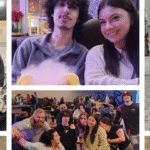Joy Harris, a celebrated motorcycle racer and stunt performer, tragically lost her life on August 14, 2017, during the filming of Deadpool 2 in Vancouver, British Columbia.
She was performing a stunt on the set of the film when the fatal accident occurred. Joy’s death not only shocked the entertainment and stunt communities, but also raised urgent questions about safety on film sets particularly for stunt professionals of color and women in the industry.
Joy, a 40-year-old African American woman, was a trailblazer in motorcycle racing long before she stepped onto a Hollywood set. She held the distinction of being the first African American licensed female road racer in the U.S., and was widely respected for her discipline, courage, and skill on two wheels.
She had a reputation for excellence in a sport historically dominated by men, and her presence in the racing world broke barriers and inspired others, especially young Black girls with dreams of motorsports.
Her work on Deadpool 2 marked her debut as a stunt double in a major motion picture. She was hired to perform motorcycle stunts for the character Domino, portrayed by actress Zazie Beetz.
On the day of the accident, Harris lost control of the motorcycle, crashed through a glass window of a building, and was killed instantly. Subsequent investigations revealed she was not wearing a helmet because the character she was doubling for did not wear one in the scene.
While Harris was an experienced racer, many in the stunt community pointed out that she had not had time to rehearse adequately for the stunt and did not have prior stunt experience. Concerns were raised about the safety protocols on set and the decision to have a non-stunt professional execute a complex motorcycle maneuver.
The tragedy was compounded by what some perceived as a muted response from the production. Deadpool 2 star and executive producer Ryan Reynolds issued a statement expressing his heartbreak over Harris’s death, but many felt that broader industry accountability was lacking.
In the years following, critics have raised questions about whether enough was done to ensure Harris’s safety and whether her death was properly acknowledged within the film industry.
Moreover, Harris’s death has been cited in larger conversations about representation and equity in Hollywood stunt work. Black stuntwomen are vastly underrepresented and often denied the same opportunities or protections afforded to others.
Joy Harris’s death became a rallying point for advocates demanding better safety standards, inclusive hiring practices, and recognition of stunt performers—especially those from marginalized communities.
As the news of her passing spread, tributes poured in from both the racing and stunt communities. Friends and fellow racers remembered her not just for her groundbreaking accomplishments, but for her humility, grace, and fierce determination. “Joy was fearless,” one colleague shared. “She lived with passion and purpose, and she deserved more from this industry.”
Joy’s legacy continues to resonate. Her story has become a call to action for systemic change in how stunt professionals—especially women and people of color are trained, hired, and protected. Advocacy groups have since worked to honor her memory by pushing for reforms in the entertainment industry’s treatment of stunt workers.
Joy Harris should be remembered not just as the woman who died on the Deadpool 2 set, but as a pioneer in her field, a barrier-breaker, and a reminder of the cost of negligence. Her life and career reflected excellence and bravery, and her tragic death should continue to fuel conversations about safety, equity, and justice in Hollywood.




